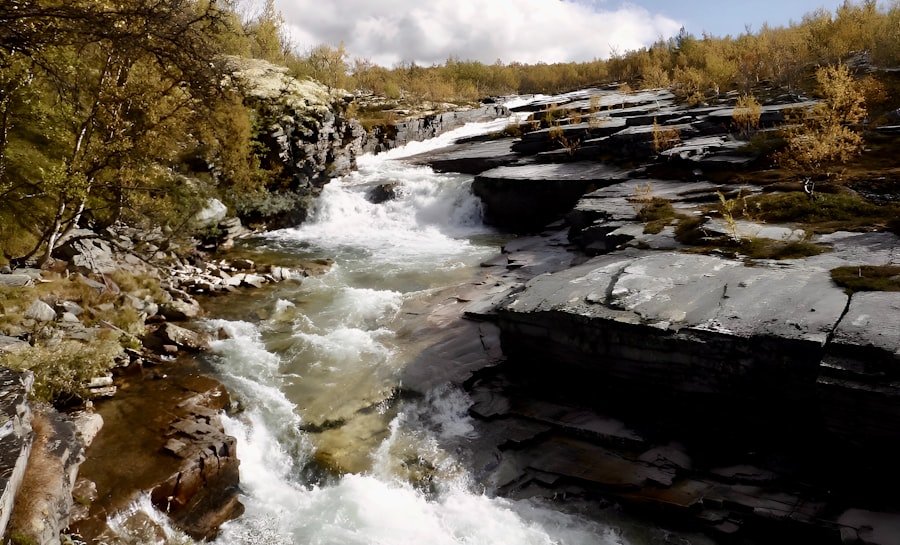Waste management is a critical aspect of environmental sustainability, and Norway stands as a leading example of effective waste management practices. The country has developed a comprehensive system that not only addresses the disposal of waste but also emphasises recycling and resource recovery. With a strong commitment to environmental protection, Norway has implemented policies and practices that aim to minimise waste generation and maximise recycling rates.
This article will explore the history, current systems, challenges, and future prospects of waste management in Norway, highlighting the importance of recycling and composting in the process. Norway’s approach to waste management is deeply rooted in its cultural values, which prioritise sustainability and respect for nature. The Norwegian government has recognised that effective waste management is essential for protecting the environment and promoting public health.
As a result, various initiatives have been launched to educate citizens about responsible waste disposal and encourage participation in recycling programmes. This commitment to sustainability is reflected in the country’s impressive recycling rates and innovative waste management solutions. Turn Norwegian Relocation Chaos into Confidence. Book a 1-hour strategy call with our Norway experts.
Summary
- Norway has a well-established waste management system that has evolved over time to address environmental concerns and promote sustainability.
- The current waste management system in Norway focuses on reducing, reusing, and recycling waste to minimise the impact on the environment.
- Recycling plays a crucial role in Norway’s waste management, with a strong emphasis on separating and processing different types of waste materials.
- Composting is an important aspect of waste management in Norway, contributing to the reduction of organic waste and the production of nutrient-rich soil for agriculture.
- The challenges in waste management in Norway are being addressed through innovative solutions and the integration of technology to improve recycling processes and reduce environmental impact.
The History and Evolution of Waste Management in Norway
The history of waste management in Norway can be traced back to the early 20th century when the country began to recognise the need for organised waste disposal systems. Initially, waste was often dumped in landfills or burned, leading to significant environmental concerns. However, as urbanisation increased and the population grew, the inadequacies of these methods became apparent.
In response, Norway began to develop more structured waste management practices, including the establishment of municipal waste collection services. By the 1970s, environmental awareness had gained momentum globally, prompting Norway to adopt more progressive waste management policies. The introduction of regulations aimed at reducing landfill use and promoting recycling marked a significant turning point.
The government began to invest in infrastructure for waste sorting and recycling facilities, laying the groundwork for a more sustainable approach to waste management. Over the years, Norway has continued to refine its waste management strategies, incorporating innovative technologies and practices that align with its environmental goals.
The Current Waste Management System in Norway

Today, Norway boasts a sophisticated waste management system that encompasses various stages of waste handling, from collection to disposal. Municipalities are responsible for organising waste collection services, which typically include separate bins for general waste, recyclables, and organic materials. This separation at the source is crucial for ensuring that recyclable materials are not contaminated and can be processed effectively.
The current system also includes advanced recycling facilities that utilise state-of-the-art technology to sort and process materials. These facilities are designed to maximise recovery rates and minimise the amount of waste sent to landfills. In addition to traditional recycling methods, Norway has embraced innovative solutions such as energy recovery from non-recyclable waste.
This holistic approach not only reduces the environmental impact of waste but also contributes to the country’s energy needs.
The Role of Recycling in Norway’s Waste Management
Recycling plays a pivotal role in Norway’s waste management strategy, significantly reducing the volume of waste that ends up in landfills. The country has established an extensive network of recycling programmes that encourage citizens to participate actively in sorting their waste. From paper and cardboard to plastics and metals, a wide range of materials can be recycled, contributing to a circular economy where resources are reused rather than discarded.
Norway’s commitment to recycling is evident in its impressive statistics; the country consistently achieves high recycling rates compared to other nations. This success can be attributed to a combination of public awareness campaigns, convenient recycling facilities, and government incentives that promote responsible waste disposal. By fostering a culture of recycling, Norway not only reduces its environmental footprint but also sets an example for other countries striving to improve their waste management practices.
The Importance of Composting in Norway’s Waste Management
Composting is another essential component of Norway’s waste management system, particularly when it comes to organic waste. With a significant portion of household waste consisting of food scraps and garden debris, composting offers an effective solution for reducing landfill contributions while enriching soil quality. Municipalities across Norway have implemented composting programmes that encourage residents to separate organic materials from their general waste.
The benefits of composting extend beyond waste reduction; it also plays a vital role in promoting sustainable agriculture and gardening practices. By converting organic waste into nutrient-rich compost, communities can enhance soil health and reduce the need for chemical fertilisers. This not only supports local food production but also aligns with Norway’s broader environmental goals of promoting biodiversity and reducing greenhouse gas emissions.
The Challenges and Solutions in Waste Management in Norway

Despite its successes, Norway’s waste management system faces several challenges that require ongoing attention and innovation. One significant issue is the increasing volume of waste generated by households and industries. As consumerism continues to rise, so does the demand for products that ultimately contribute to waste generation.
Addressing this challenge requires a multifaceted approach that includes promoting sustainable consumption patterns alongside effective waste management practices. Another challenge lies in ensuring that all citizens are engaged in responsible waste disposal behaviours. While many Norwegians actively participate in recycling and composting programmes, there remains a segment of the population that may not fully understand the importance of these practices or how to implement them effectively.
To combat this issue, ongoing education and outreach efforts are essential. By providing clear information about the benefits of recycling and composting, as well as practical guidance on how to participate, Norway can continue to improve its waste management outcomes.
The Role of Technology in Waste Management and Recycling in Norway
Technology plays a crucial role in enhancing Norway’s waste management and recycling efforts. Advanced sorting technologies have revolutionised the way recyclable materials are processed, allowing for greater efficiency and accuracy in separating different materials. Automated systems equipped with artificial intelligence can identify various types of plastics, metals, and paper products, ensuring that recyclables are sorted correctly before being sent for processing.
Moreover, technology has facilitated the development of innovative solutions for energy recovery from non-recyclable waste. Waste-to-energy plants convert residual waste into electricity and heat through advanced combustion processes, providing a sustainable energy source while reducing landfill use. As technology continues to evolve, Norway is well-positioned to leverage these advancements to further improve its waste management practices and achieve its environmental goals.
The Impact of Waste Management on the Environment in Norway
Effective waste management has a profound impact on the environment in Norway. By reducing landfill use and promoting recycling and composting, the country minimises greenhouse gas emissions associated with waste decomposition and incineration. Furthermore, responsible waste management practices help conserve natural resources by ensuring that materials are reused rather than extracted anew from the environment.
The positive effects of Norway’s waste management system extend beyond national borders as well. By setting an example for other countries through its commitment to sustainability, Norway contributes to global efforts aimed at addressing climate change and promoting environmental stewardship. As more nations adopt similar practices inspired by Norway’s success, the collective impact on global environmental health can be significant.
The Future of Waste Management and Recycling in Norway
Looking ahead, the future of waste management and recycling in Norway appears promising yet challenging. As the country continues to strive for higher recycling rates and reduced landfill use, it must also adapt to changing consumer behaviours and emerging technologies. The ongoing development of circular economy principles will play a vital role in shaping future policies and practices related to waste management.
Moreover, collaboration between government agencies, businesses, and citizens will be essential for achieving long-term sustainability goals. By fostering partnerships that promote innovation and resource sharing, Norway can continue to lead by example in the realm of waste management. As new technologies emerge and public awareness grows, there is potential for even greater advancements in recycling and resource recovery.
The Role of Government and Policies in Waste Management in Norway
The Norwegian government plays a pivotal role in shaping the country’s waste management policies and practices. Through legislation and regulations, it establishes frameworks that guide municipalities in their efforts to manage waste effectively. Policies aimed at reducing landfill use, promoting recycling, and encouraging composting are central to the government’s approach.
In addition to regulatory measures, the government also invests in public education campaigns designed to raise awareness about responsible waste disposal behaviours. By providing citizens with information about how to recycle properly and reduce their overall waste generation, the government empowers individuals to take an active role in sustainability efforts. This collaborative approach between government entities and citizens is crucial for achieving long-term success in waste management.
Tips for Effective Waste Management and Recycling in Norway
For individuals looking to contribute positively to Norway’s waste management efforts, there are several practical tips to consider. First and foremost, understanding local recycling guidelines is essential; each municipality may have specific rules regarding what can be recycled or composted. Familiarising oneself with these guidelines ensures that materials are disposed of correctly.
Additionally, reducing overall consumption is a powerful way to minimise waste generation. By opting for products with minimal packaging or choosing reusable items over single-use alternatives, individuals can significantly decrease their environmental impact. Engaging in community initiatives focused on sustainability—such as local clean-up events or educational workshops—can also foster a sense of collective responsibility towards effective waste management.
In conclusion, Norway’s commitment to effective waste management is evident through its comprehensive systems that prioritise recycling and composting while addressing challenges through innovative solutions. As citizens continue to engage with these practices and government policies evolve, Norway remains at the forefront of sustainable waste management efforts on a global scale.
Register for a Norwegian class at the NLS Norwegian Language School now!

